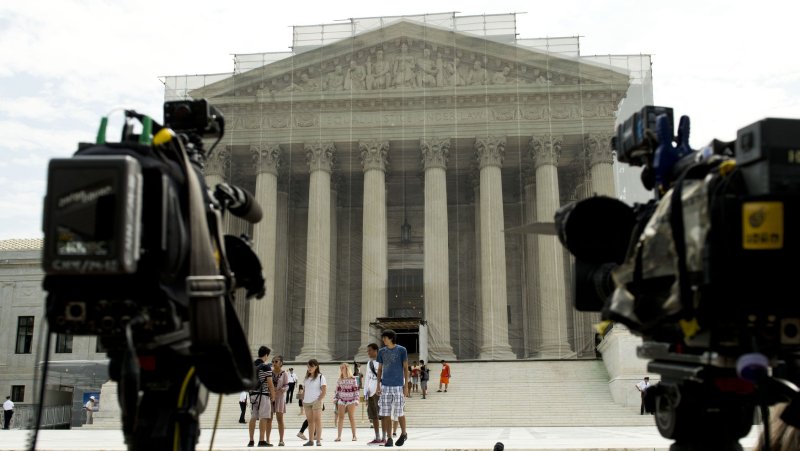The Supreme Court is seen on June 24, 2013 in Washington, D.C. UPI/Keivn Dietsch |
License Photo
WASHINGTON, June 25 (UPI) -- The U.S. Supreme Court, in a 5-4 vote Tuesday, struck down a core provision of the Voting Rights Act that singles out part of the country for special treatment.
The outlawed provision, Section 4, identifies all or parts of 16 states, mainly in the South. A separate provision, Section 5, not struck down by the Supreme Court, forces them to get permission -- or "preclearance" -- from the U.S. Justice Department or a three-judge federal panel in Washington to make any changes in how people vote in their jurisdictions, no matter how innocuous.
But without the identifying the parts of the country affected, the "preclearance" requirement is meaningless.
The landmark ruling frees up many parts of the country that have a history of discriminating against minorities from federal supervision.
In the majority opinion, Chief Justice John Roberts said the conditions that required Washington supervision no longer apply. Four other conservatives joined him. The court's four liberals dissented.
The core provisions of the Voting Rights Act were challenged by Shelby County, Ala. The "covered jurisdictions" of the act include Alabama, Alaska, Arizona, Georgia, Louisiana, Mississippi, South Carolina and Texas, most of Virginia, and bits and pieces elsewhere.
The lower courts ruled for the act, but the U.S. Supreme Court reversed, saying Section 4 is unconstitutional because the purpose of the act no longer reflects conditions in the covered jurisdictions.
"Our decision in no way affects the permanent, nationwide ban on racial discrimination in voting found in Section 2 [of the act]," Roberts said. "We issue no holding on Section 5 itself, only on the coverage formula. Congress may draft another formula based on current conditions. Such a formula is an initial prerequisite to a determination that exceptional conditions still exist justifying such an 'extraordinary departure from the
traditional course of relations between the states and the federal government.
"Our country has changed, and while any racial discrimination in voting is too much, Congress must ensure that the legislation it passes to remedy that problem speaks to current conditions."
Justice Ruth Bader Ginsburg dissented, joined by the three other liberals.
"In the [court majority's] view, the very success of Section 5 of the Voting Rights Act demands its dormancy," she said. "Congress was of another mind. Recognizing that large progress has been made, Congress determined, based on a voluminous record, that the scourge of discrimination was not yet extirpated. The question this case presents is who decides whether, as currently operative, Section 5 remains justifiable, [the Supreme Court or Congress]."
The 1965 Voting Rights Act was overwhelmingly re-enacted by Congress in 2004.















